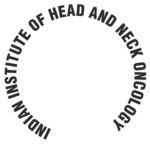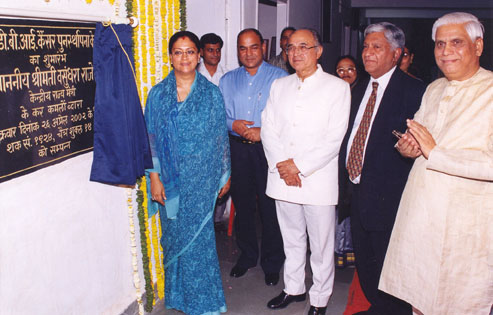Counseling & Rehabilitation
It often happens that a cancer patient requires
physical and/or financial rehabilitation.
A Mastectomy Club started with a mastectomy patient going to Mumbai (at a distance of approximately 600 km. from Indore) in order to get breast prosthesis. Motivated by a strong desire to help others, she underwent training in this field. Subsequently, she offered emotional support and breast prosthesis guidance to the other patients, her positive and matter of fact approach to her disease, a morale booster to the new patients.
The Breast Cancer Support Group was started on 2nd October 2002 with the idea of expanding the support services offered to breast cancer patients. The attempt was to facilitate the path back to normal life. For this it is necessary that the lady be able to view breast cancer as something that happened to her and that has been dealt with as best as is possible (given the state at which it was detected). Breast cancer is not her defining identity, losing a breast should not be seen as a loss of her femininity. The group would facilitate the coming together of women with a similar experience, who could empower each other and enrich lives. Talking to others who have gone through the same experience helps; the sharing very often creates a bond and facilitates a degree of openness, which in itself is a healing process; in addition to the learning that ensues from the information shared. We consciously decided not to confine the membership to any particular group of breast cancer patients, because ‘cured and living a normal life 20 years post-op’ to ‘a person with a galloping cancer’ are 2 ends of the spectrum, the reality of living with cancer.
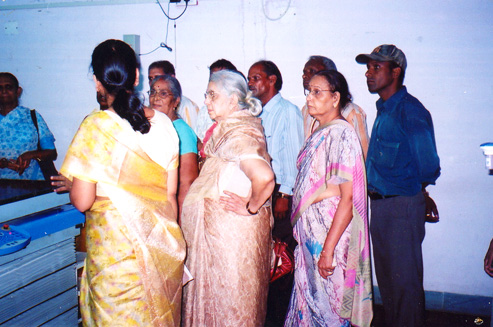
Members of the Breast Cancer Support Group being shown around the radiotherapy facility at our institute.
The Group met regularly over 7 years, with a talk by a specialist (oncologist or a physiotherapist or a nutritionist or even a yoga expert) or one of the members, as the main feature, normally followed by a question and answer session. The support group lived up to its name, with newer members, especially those undergoing treatment benefitting from talking to the older members. Initially, the meetings were exclusively for breast cancer patients. Subsequently, family members were invited to join some of the meetings.
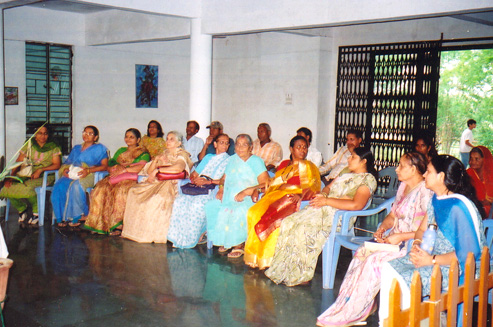 During the interactive session with Dr. Vandana Jain, Radiotherapist at our institute.
During the interactive session with Dr. Vandana Jain, Radiotherapist at our institute.In October 2009 it was decided to change the format of BCSG. Now, meetings are not held at fixed periodicity but have a free flowing format and periodicity.This decision was influenced by the fact that some patient support groups have been started by patients after completion of their own treatment.
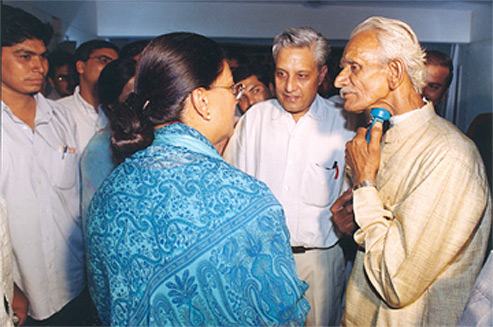 Mr. Narayan Singh Sankhla, a laryngectomee patient, talking to Smt. Vasundhara Raje at the rehabilitation centre inauguration programme.
Mr. Narayan Singh Sankhla, a laryngectomee patient, talking to Smt. Vasundhara Raje at the rehabilitation centre inauguration programme.In February 1998, a laryngectomy Club was established for the rehabilitation and voice restoration of patients with cancer of the voice box (larynx), who lose their voice after extirpative surgery. Loss of speech is a traumatic experience, however, it is possible to rehabilitate such patients. Apart from other methods, an electrolarynx can help them get trained in recovering their voices. The club has successfully generated high motivation for speech recovery with the help of electro-larynxes gifted by Mrs. Joyce Mitchell on behalf of the Seattle Laryngectomy Club. Total laryngectomy is nearly a procedure of the past now. Though it is still be done for a very small sub set of patients, potent options are available that offer voice conservation which is in line with the current thinking of organ preservation though never at the cost of preservation of cancer per se. To summarize, total removal of the voice box is still being done but the numbers are greatly reduced.
Often a cancer patient may also require support for financial rehabilitation. The cost of treatment, the need to do less demanding or no work during treatment and/or thereafter, at times the treatment may cause a physical debilitation that impinges on the person’s ability to work, are some of the factors that place a strain on the patient’s financial resources.
Appreciating this problem, the Industrial Development Bank of India (IDBI), under its community development project gave a grant for the construction of the necessary building. The grant, however, did not cover the purchase of the required equipment and the recurring cost of running the centre. Today, the construction is complete and patients receive physiotherapy. In addition, we counsel patients and/or families and help them identify government-aided institutes that offer free or subsidized vocational training.
We are now working on evolving an employment cell. This cell will comprise of volunteers. The patients and/or families who require support in finding employment will be interviewed and the volunteers will try and contact potential employers. We have to create a database of companies who are sympathetic to the plight of cancer patients and are willing recruit such candidates. Gradually, finances permitting, we will expand our rehabilitation work.
